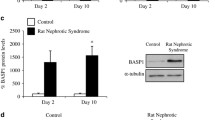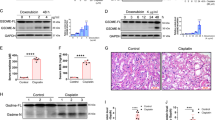Abstract
Cisplatin is known to induce serious renal damage including acute renal failure, the major site of renal injury appears to be localized to the third segment of the proximal tubule (S3). Apoptosis occurs during a variety of acute injuries to tubule cell. The purpose of this study was to determine whether cisplatin induces apoptosis of immortalized mouse S3 cells, and to define the intracellular pathways leading to cell death. S3 cells exposed to cisplatin exhibited biochemical, morphological, and flow cytometric changes characteristic of apoptosis associated with slight necrosis. Cisplatin-induced apoptosis could be inhibited by overexpression of crmA, a cowpox virus gene, of which the product is known to suppress activities of the interleukin-1β converting enzyme (ICE) family proteases. On the other hand, overexpression of bcl-2, an antiapoptotic oncogene, rendered S3 cells partially resistant to cisplatin. These results indicate that cisplatin-induced proximal tubule damage is associated with apoptosis, which is positively modulated by the ICE family of proteases and negatively by the product of bcl-2.
Similar content being viewed by others
Author information
Authors and Affiliations
Additional information
Received: 4 March 1997 / Accepted: 30 April 1997
Rights and permissions
About this article
Cite this article
Takeda, M., Kobayashi, M., Shirato, I. et al. Cisplatin-induced apoptosis of immortalized mouse proximal tubule cells is mediated by interleukin-1β converting enzyme (ICE) family of proteases but inhibited by overexpression of Bcl-2. Arch Toxicol 71, 612–621 (1997). https://doi.org/10.1007/s002040050434
Issue Date:
DOI: https://doi.org/10.1007/s002040050434




